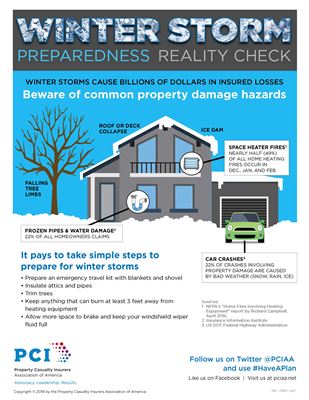What will a Winter Storm Reality Check Reveal about Your Preparedness?

PCI Says Be Ready
CHICAGO – With winter storms causing more than $1 billion in insured losses each year, the Property Casualty Insurers Association of America (PCI) urges property owners to take a winter storm preparedness reality check to ensure they are ready.
“While winter storms can be very dangerous and cause significant damage for drivers and homeowners, by taking a few simple steps you can ensure you’re ready for the next Arctic blast or storm system,” said Chris Hackett, senior director of personal lines for PCI. “Some of the most common winter insurance claims include burst pipes, damage from falling tree limbs, roof or deck collapses and car accidents. However, insurers are ready to work with consumers to minimize the inconveniences and help make the claims process go as smoothly as possible if consumers face damage.”
To help motorists and homeowners protect their property and avoid insurance claims during the harsh winter months, PCI encourages property owners to take a reality check regarding their preparedness.
Ask yourself the following:
Do you allow extra space to brake when driving during the winter?
Have you prepared an emergency travel kit for your car and/or home?
Have you checked your attic and pipes to ensure they have proper insulation?
Have you made sure your heating system and chimney have been cleaned and inspected?
Have you talked with your insurance agent or company to review and understand your coverage?
Have you made sure home smoke detectors and carbon monoxide alarms are installed and working?
If you did not answer yes to all these questions, you could benefit from taking extra precautions so that you are ready for the inevitable snow, ice and cold. PCI has winter storm preparedness information available in its Winter Storm Headquarters.
Winter Driving Tips
Hazardous road conditions make it even more important to take safety precautions and drive defensively. Slow down and keep extra distance between your car and other vehicles.
Winterize your car by checking your antifreeze, battery, tires and windshield wiper fluid. Make sure your headlights, taillights and emergency flashers are working.
Prepare an emergency travel kit with items such as blankets, jumper cables, a shovel, a flashlight, salt, flares and other emergency supplies. A toolkit, bottled water and snack food are also useful items to include.
Keep at least half of a tank of gas in your car at all times.
Cold Weather Homeowners Tips
Heating equipment is a leading cause of home fire deaths. It is important to keep anything that can burn at least 3 feet from heating equipment (furnace, fireplace, wood stove, and portable heater).
Frozen water pipes represent the biggest potential problem for most homes. A little advance planning will usually prevent frozen pipes.
Insulate pipes, especially those leading to the outside, and plug holes around the pipes with insulation or spray-in foam. Make sure there is warm air flowing around pipes that are located near an outside wall. Check pipes under sinks to make sure they will get adequate heat.
If you plan to travel and leave your home unoccupied for several days in cold weather, be sure to keep your heat on to prevent pipes from freezing.
Make sure there is clear access to the main water shut-off valve in case there is a leak or a pipe suddenly bursts.
Tags:




